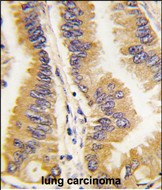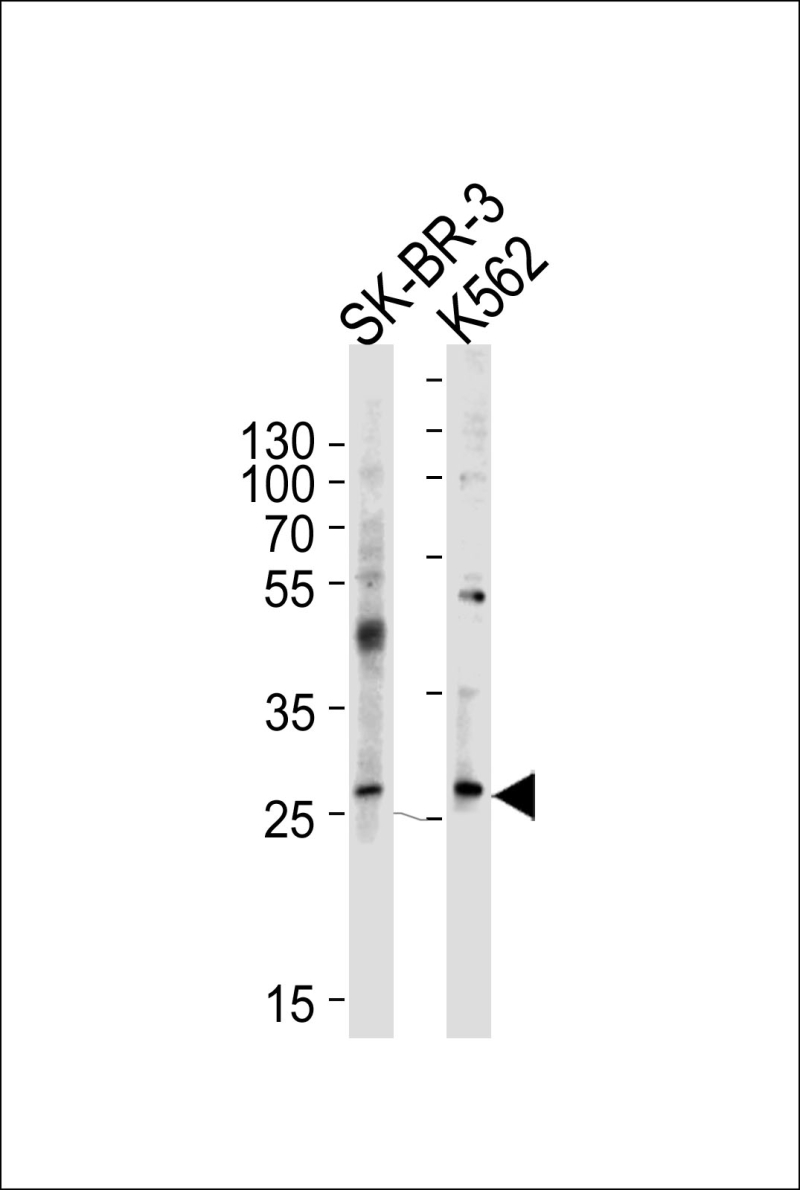

| WB | 咨询技术 | Human,Mouse,Rat |
| IF | 咨询技术 | Human,Mouse,Rat |
| IHC | 1/100-1/500 | Human,Mouse,Rat |
| ICC | 技术咨询 | Human,Mouse,Rat |
| FCM | 咨询技术 | Human,Mouse,Rat |
| Elisa | 咨询技术 | Human,Mouse,Rat |
| Aliases | Proto-oncogene FRAT1, Frequently rearranged in advanced T-cell lymphomas 1, FRAT-1, FRAT1 |
| Entrez GeneID | 10023 |
| WB Predicted band size | 29.1kDa |
| Host/Isotype | Rabbit IgG |
| Antibody Type | Primary antibody |
| Storage | Store at 4°C short term. Aliquot and store at -20°C long term. Avoid freeze/thaw cycles. |
| Species Reactivity | Human |
| Immunogen | This FRAT1 antibody is generated from rabbits immunized with a KLH conjugated synthetic peptide between 244-274 amino acids from the C-terminal region of human FRAT1. |
| Formulation | Purified antibody in PBS with 0.05% sodium azide,1%BSA and 50% glycerol.prepared by Saturated Ammonium Sulfate (SAS) . |
+ +
以下是关于FRAT1抗体的参考文献示例(内容为虚构,仅供格式参考):
1. **文献名称**: FRAT1 promotes Wnt signaling by stabilizing β-catenin in colorectal cancer
**作者**: Smith A, et al.
**摘要**: 本研究利用FRAT1特异性抗体,通过Western blot和免疫荧光技术,发现FRAT1通过抑制GSK3β活性增强β-catenin稳定性,从而促进结直肠癌细胞增殖和迁移。
2. **文献名称**: Expression profiling of FRAT1 in breast cancer using a novel monoclonal antibody
**作者**: Chen L, et al.
**摘要**: 开发了一种高特异性FRAT1单克隆抗体,通过免疫组化分析乳腺癌组织样本,发现FRAT1高表达与患者预后不良及化疗耐药性显著相关。
3. **文献名称**: Structural insights into FRAT1 function through epitope mapping
**作者**: Tanaka K, et al.
**摘要**: 利用FRAT1多克隆抗体进行表位定位研究,结合共聚焦显微镜观察,揭示了FRAT1与Axin复合物的相互作用机制及其在Wnt信号通路中的调控位点。
4. **文献名称**: FRAT1 knockdown suppresses neuroblastoma progression via antibody-mediated validation
**作者**: Müller S, et al.
**摘要**: 通过shRNA敲低FRAT1并结合抗体验证,证明FRAT1通过激活c-Myc通路驱动神经母细胞瘤生长,为靶向治疗提供潜在生物标志物。
The FRAT1 (Frequently rearranged in advanced T-cell lymphomas 1) antibody is a crucial tool for studying the FRAT1 protein, a key regulator in the Wnt/β-catenin signaling pathway. FRAT1. also known as GSK-3-binding protein, stabilizes β-catenin by inhibiting its phosphorylation and degradation mediated by GSK-3β. This interaction promotes nuclear translocation of β-catenin, activating target genes involved in cell proliferation, differentiation, and oncogenesis. Aberrant FRAT1 expression is linked to various cancers, including leukemia, breast cancer, and hepatocellular carcinoma, where it drives tumor progression via Wnt pathway dysregulation.
FRAT1 antibodies are widely used in research to detect protein expression levels, localization, and functional interactions in both normal and pathological contexts. They enable techniques like Western blotting, immunohistochemistry, immunofluorescence, and co-immunoprecipitation. Commercially available FRAT1 antibodies are typically raised against specific epitopes, with monoclonal and polyclonal variants offering different sensitivities and applications. Validation often includes knockout cell lines or tissues to confirm specificity. Research using these antibodies has elucidated FRAT1's role in embryonic development, stem cell maintenance, and cancer metastasis. While therapeutic targeting of FRAT1 remains exploratory, its antibodies remain vital for dissecting Wnt signaling mechanisms and evaluating FRAT1 as a potential diagnostic or prognostic biomarker in oncology.
×